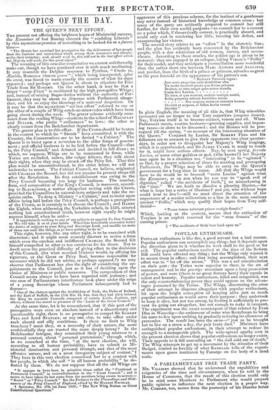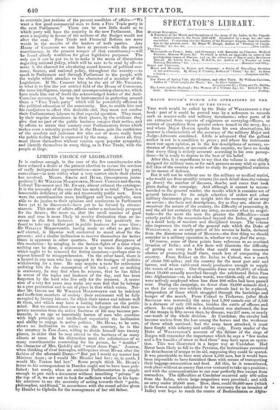A PARLIAMENTARY FREE TRADE PARTY.
MIL VILLIERS showed that he understood the capabilities and exigencies of the time and circumstances, when be told in the House of Commons, that the result of this election could only be to send some Members to Parliament who would prepare public opinion to influence the next election in a proper way. Mr. Cosmic, too, seems from the postscript of his Dundee letter to entertain just notions of the present condition of affairs—"We want a few good commercial men to form a Free Trade party in the next Parliament." There can be now little doubt as to which' party will have the majority in the new Parliament. But even a majority in favour of the authors of the Budget would not alter the case. Free Trade and Financial Reform are mere words in the mouths of the leaders of both parties. Any House of Commons we can have at present—with the present constituency, in the present temper of that constituency—will be found utterly worthless for great legislative purposes. The only use- it can be put to, is to make it the arena of discussions regarding national policy, which will be sure to be read by all—to make it the channel for circulating sound lessons of political eco- nomy, finance, and national policy, throughout the country—to speak in Parliament and through Parliament to the people, with the weight which attaches to the character of a member of the Legislature. If Mr. COBDEN bring to the aid of Mr. VILLIERS, in what is to him the yet untried field of the House of Commons, the same intelligence, energy, and uncompromising character, which have made him out of doors the acknowledged leader of the Anti- Corn-law movement, he may be instrumental in gathering around them a "Free Trade party" which will be powerfully efficient in the political education of the community. But, to enable him and his coadjutors to effect this desirable end, they must not confine their Parliamentary labours to that especial question. They must, by their regular attendance in their places, by the evidence they give that no part of the public business escapes their notice, and by efforts to attain that mastery over Parliamentary forms which makes even a minority powerful in the House, gain the confidence of the resolute and judicious few who out of doors really form the public feeling that is expressed by the many. Above all, they must throw themselves without reserve upon popular sympathy, and identify themselves in every thing, as in Free Trade, with the people at large.



























 Previous page
Previous page